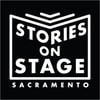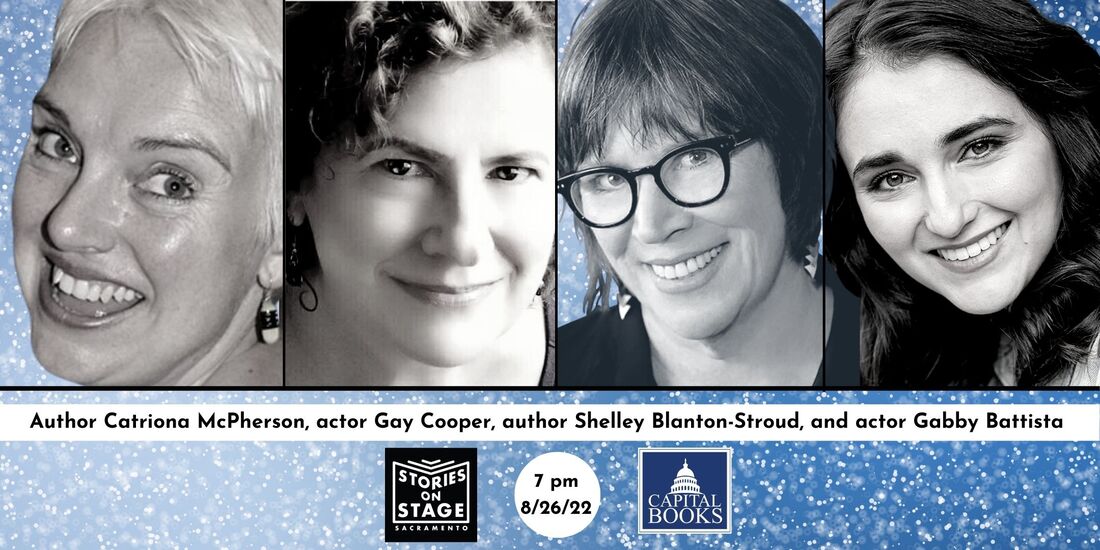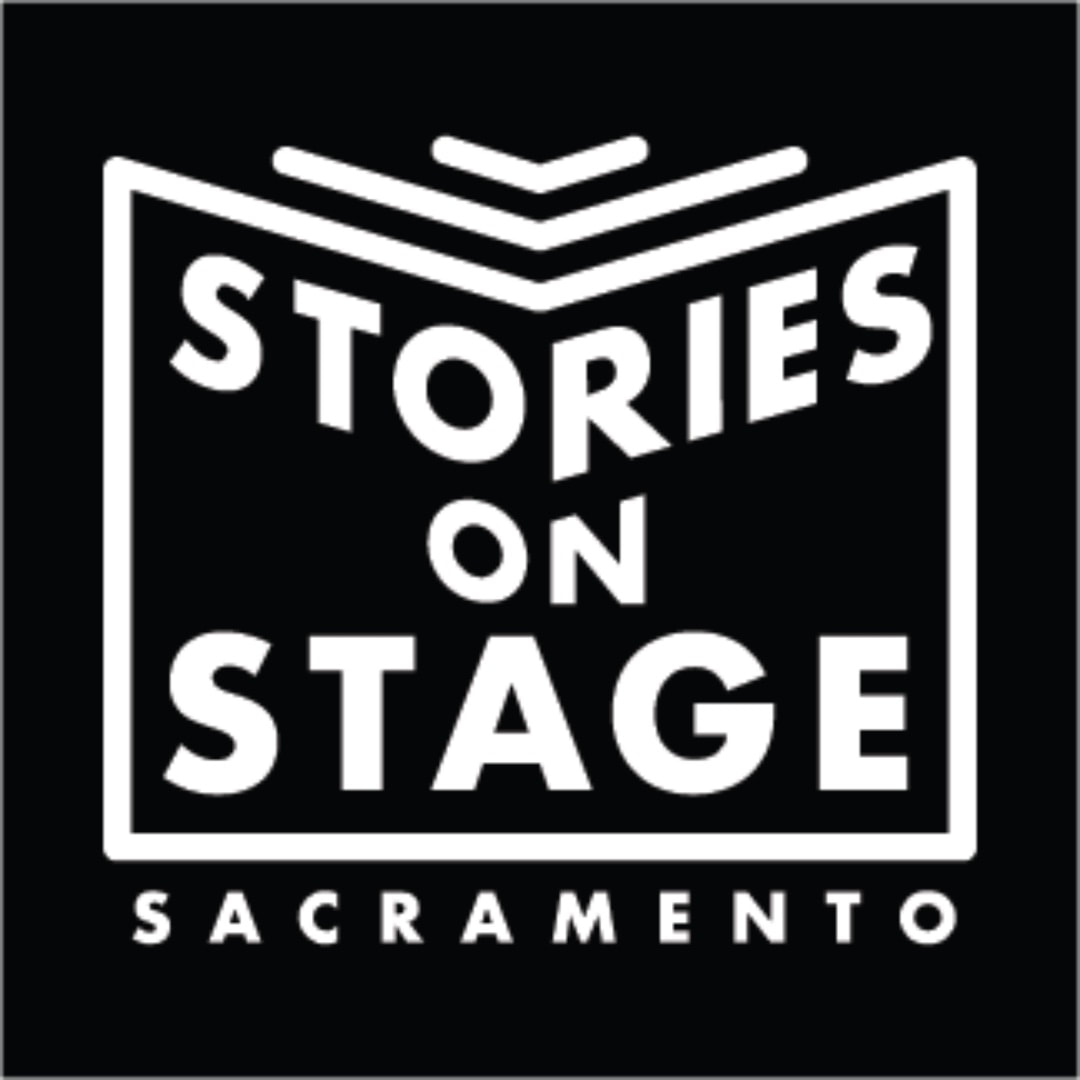|
Friday, August 26, (doors open at 6:30, performance begins at 7:00) Stories on Stage Sacramento presents a performance of stories by authors Catriona McPherson and Shelley Blanton-Stroud live, on stage, at the lovely Clara Auditorium in Midtown, Sacramento. Tickets available at the door and via Eventbrite Actor Spotlight: Gay Cooper Gay Cooper will join SOSS to read an excerpt from Catriona McPherson’s novel Scot Mist. Jessica talked to Cooper about her passion for storytelling and overcoming health challenges to do what she loves. Jessica: Gay, you’ve read for us many times over the years and we’re so glad to have you back. How did you first get into performing? Gay: I took acting classes in high school and was singled out by my drama teacher—bless her heart—as having some potential in that area, so that encouraged me. It was nice to have validation for something I could do well. That had been lacking in my student life. I loved the creative process of digging into a story and whatever character I was portraying and their relationship to others in the story. I loved that whole process of putting all the pieces together to create a story to share with people. I then went to the University of Tennessee in Knoxville and majored in theater. I came to Sacramento in 1982 with my soon-to-be-husband, Karl, and wanted to see what opportunities were here. I took some classes and was introduced to various people in the theater community, then I started auditioning. I’ve enjoyed every opportunity I’ve been given to be part of that kind of storytelling. Jessica: You’ve worked all over town as an actor—including with Resurrection Theatre, Big Idea Theatre, KOLT Run Creations and California Stage—but you’ve also done work outside of the theater. Can you tell us about that? Gay: I’ve had rheumatoid arthritis for 40 years, which is quite a rollercoaster. I worked in health education as a facilitator for classes for the Arthritis Foundation (where I was a program director in the late ‘80s) and I contracted at other health care facilities, including Kaiser, to facilitate health classes for people with chronic conditions. We held small-group classes where participants could relate to our process and we could relate to theirs. My experience in acting really helped in this job, actually. I had to be in the moment and engaged, and listening was an extremely important part of that group process, as it is in acting. You’re not just lecturing, it’s a whole give-and-take process within a standardized format. Jessica: How has your health affected your acting career? Gay: It depends on where I am in the disease process, which includes flares—like I said, it’s a rollercoaster of symptoms. You have to go with the flow. I’ve powered through a lot, and I’ve been grateful to do roles that did not require a whole lot of physicality. Some directors offered me parts realizing my circumstances and thought I could do the role with my skills and physical parameters. Others worked with me to modify (my activity) and still stay within the story the playwright had written. My last role in 2016 (Sister Cities with Resurrection Theatre) was as a woman who has ALS. During my time onstage, I was sitting and not moving—people asked me, “How could you do that?” And I said, “Quite easily!” I wasn’t motivated to move an arm that wasn’t meant to be moved. Jessica: So the Stories on Stage format must really work for you! Gay: I’m so grateful for the opportunity to act in this format—it’s a gift. My philosophy is that telling a story is telling a story—whether in the format of a play where all the words are dialogue, or a story where you get description along with the dialogue. It’s all part of the story and letting the audience know what’s going on so they can pick up on the emotions. You can tell stories in so many different ways, whether it’s in a play, book, short story, movie, piece of art, photography—it’s all storytelling and I just love it. It really informs one’s life in a positive way. Jessica: Speaking of photography, you’re also an avid photographer. Gay: I always say I’m an enthusiastic photographer but not a professional. I’ve always been interested in capturing that visual moment, but I hadn’t done it as frequently until the past 5 to 10 years when I really picked it up. Doing photography not only gives me an outlet for creative expression but also keeps me in the moment—you can’t go wandering off in the past or future when you’re doing photography, you have to focus on whatever’s in front of you—a beautiful vista, a plant, flowers, birds, insects. I love to do it and then share it. That’s what storytelling is all about: using whatever medium (you work in) and sharing it. Actor Spotlight: Gabby Battista Gabby Battista will join SOSS to read an excerpt from co-director Shelley Blanton-Stroud’s new novel Tomboy. Jessica Laskey talked to Battista about her theatrical training, her love of teaching and how she uses movement to inform her acting. Jessica: Gabby, you’ve played lots of different kinds of characters, from Jesusa in Davis Shakespeare's The Tenth Muse to Alicia in Capital Stage's production of The Thanksgiving Play, but you’ve also done a lot of Shakespeare. How did you get started with the Bard? Gabby: My mom put me into Shakespeare at a really young age. I was part of an afterschool program at North Coast Repertory Theatre in San Diego where we did full-fledged Shakespeare productions for kids. We spent two months on it—it felt like a professional production for theater education. A lot of kids in San Diego grow up with musical theater—there are tons of those programs—but my mom wanted me to focus on being more acting-driven as my foundation as a performer. She thought it would be useful to start with acting before jumping into singing and movement. I loved how complicated Shakespeare was, to have the ability to tackle a text and crack it open. I got to be a young nerd from the start. Jessica: You’ve also done a lot of movement-based performances. Is movement an integral part of your creative process? Gabby: As a personal trainer and certified yoga (instructor), I like connecting with my body. There’s something to be said about how we can store energy there. As actors, how we carry ourselves is everything—it’s all connected. As my career has developed and changed, I’ve come to really value the sense of presence: taking a moment to collect yourself and be present in the wings right before going onstage and bringing my body to a place that can feel relaxed. I have a tendency to get in my head, like we call do, so being able to bring my body and mind to a relaxed state is everything. If you practice enough, (the text) is in you, you have to just trust that you’re not going to mess up—which is a lot easier if you’re relaxed and present. Jessica: Do you incorporate movement into your teaching with young people? Gabby: Absolutely! The more you can learn to work with what you have, the more we can come out on the other side confident in our capabilities. I teach my students anxiety tools, like how to breathe and self-soothe—life tools in a theater context. I’m constantly learning from them what their needs are, which reminds me that I have to consider what my own needs are in order to get comfortable and be ready to perform. Working with kids is so wonderful because you can prepare as much as you want, but sometimes you have to throw the lesson plan out the window, which teaches you to be flexible on your feet, no matter the circumstance. Jessica: You’ve taught all over Northern California, primarily at Cal Shakes in Orinda and in Davis, San Francisco, Sacramento and Berkeley, but also overseas. Tell us about that. Gabby: I taught movement to middle school and high school teachers in Copenhagen. Danish culture is very much about perfectionism, so I taught them movement as a way of weeding out hesitation—it helped them get out of their heads and get comfortable with their bodies. I also have a friend who runs a theater company in Japan, so during COVID we developed a lesson plan to teach English through Shakespeare. It’s the same concept as learning language through watching TV. It’s not about understanding English all the way—Shakespeare is an extra-hard language, even for native English speakers—but it’s a way of disguising English in a fun costume, of taking words like “thou” and “dost” and understanding them in current English. You play this character with these lines and, as we break down each word, you’re learning English indirectly in a less pressurized environment. Jessica: So with all of these tools at your disposal, how do you prepare for a role? Gabby: I like to separate the technical from the emotional acting work. When I first take a look at a monologue—or in this case, the chapter—I read it first as if I’m just a reader or audience member. Then I go back over it and find my moments, or beats: where to breathe, where to find shifts in the story. Then, when I’ve gotten familiar with the text and it comes to the final comb-through, I start to add some character choices. Character feels like the icing on top, supported by the foundation of the other work you’ve done.
0 Comments
|
|
Who We AreLiterature. Live!
Stories on Stage Sacramento is an award-winning, nonprofit literary performance series featuring stories by local, national and international authors performed aloud by professional actors. Designated as Best of the City 2019 by Sactown Magazine and Best Virtual Music or Entertainment Experience of 2021 by Sacramento Magazine. |
|


 RSS Feed
RSS Feed
